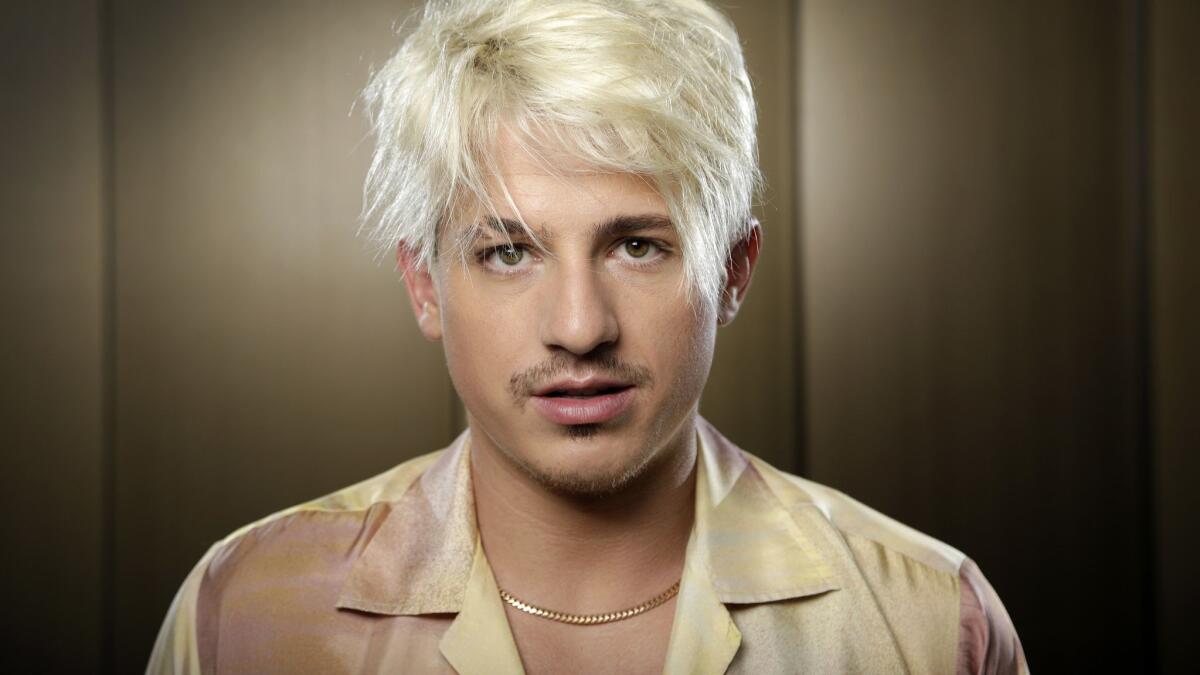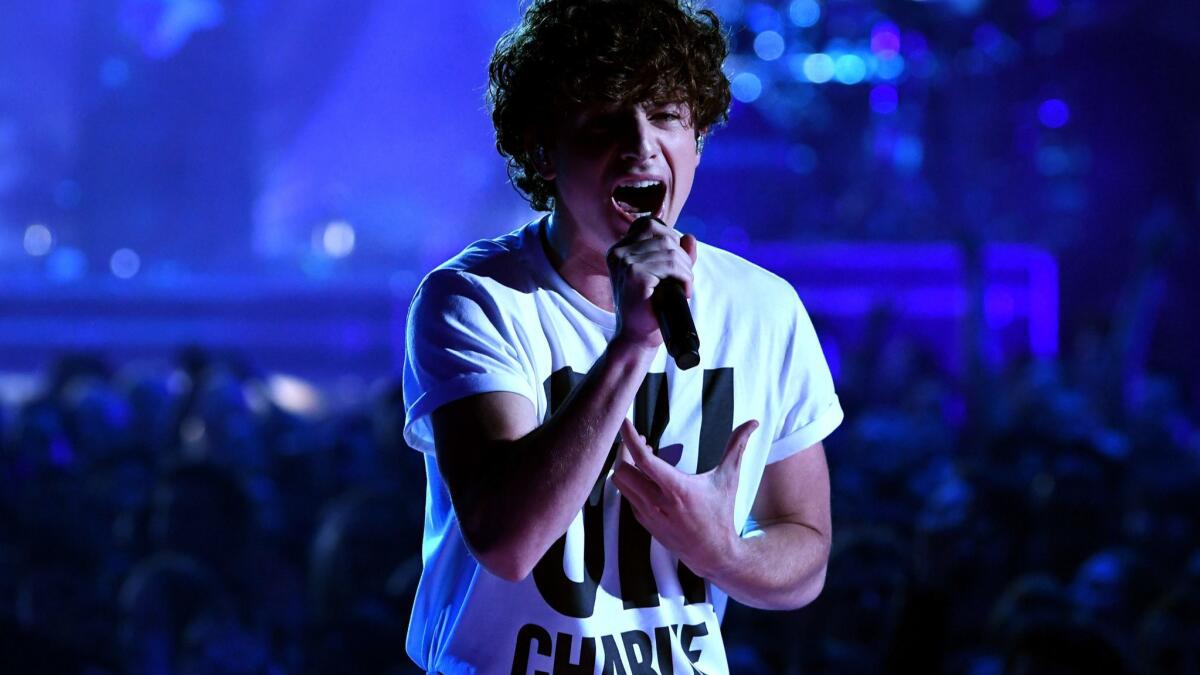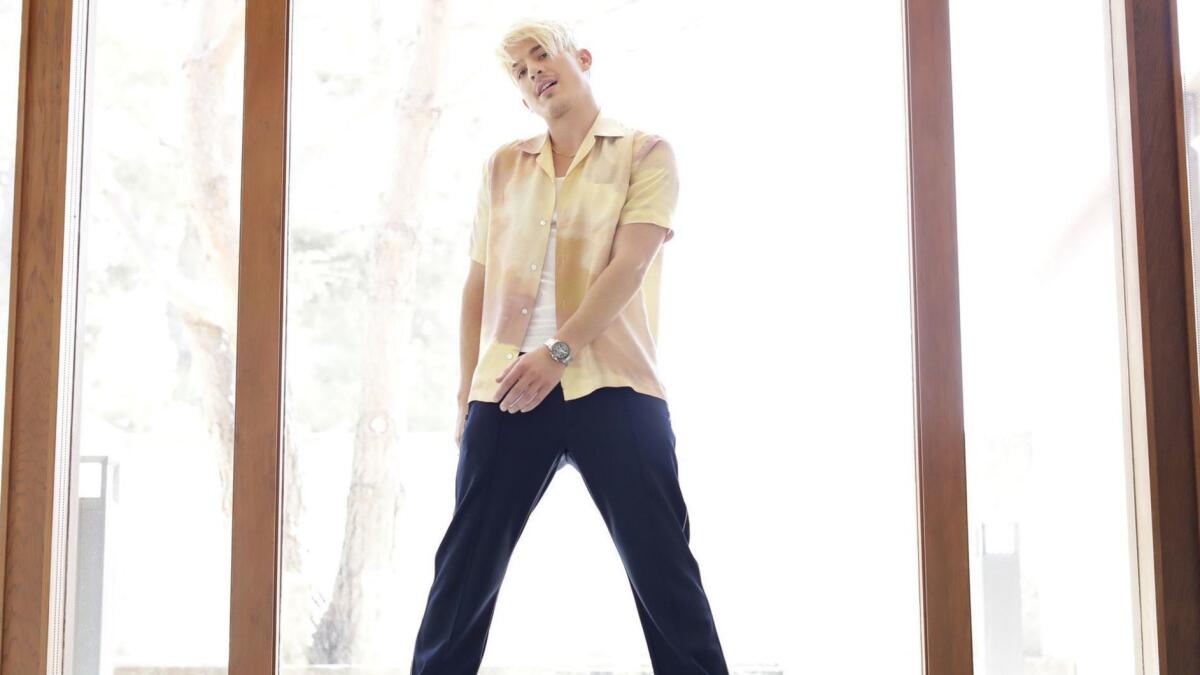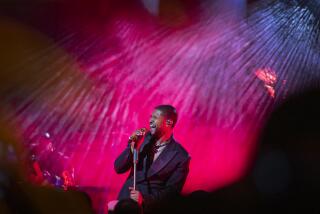Charlie Puth is headed out on tour — and he wants to impress your dad

- Share via
Charlie Puth was deep into a take-out salad at a Burbank rehearsal studio when he heard two members of his road band discussing his song “How Long,” specifically the best way to navigate a move from one section of the tune to another.
“Wait, are you guys talking about the turnaround?” the singer asked, springing up from the floor, where he’d been sitting cross-legged in pajama-style pants, a vintage keytar slung around his neck as he ate.
For the record:
9:00 a.m. July 6, 2018An earlier version of this article stated that Charlie Puth’s tour will launch July 12 in Toronto. The tour begins July 11.
At 26 years old, Puth has already scored three top-10 singles, including one — “See You Again,” his sentimental duet with Wiz Khalifa from the “Furious 7” soundtrack — that spent 12 weeks at No. 1 and established Puth as a baby-faced purveyor of toothless pop banalities. But beneath the bushy blond hairdo (more on that later) is a savant-level craftsman with perfect pitch and a thorough knowledge of the last half-century of funk and soul music.
On a recent afternoon, then, you could bet he had some ideas for that tricky sequence in “How Long,” which he proceeded to spend 25 minutes finessing with his players until it had a silky intensity — like “Luther Vandross on crack,” as his keyboardist put it proudly.
“That song was a big hit,” Puth said later of the creeping R&B number from his second album, “Voicenotes,” which came out in May. “So what you do in the live setting is you extend it. And that gives me the opportunity to get the screams.”
The singer, who was preparing for a North American tour set to launch July 11 in Toronto, explained, “I’m not a 6-foot-3, really good-looking guy. I’m just a goofy nerd. If I go onstage, people are like, ‘Oh, it’s Charlie Puth, and he’s wearing a cool shirt.’”
“But then: ‘Here he is playing an awesome solo — he must’ve been listening to Chick Corea.’”
Told that’s probably not what anyone in his young audience would think, Puth nodded reluctantly.
“But maybe the dads waiting for their kids will come into the show, and they’ll know.”
Puth’s desire to demonstrate his skills — not to mention his yearning to be taken seriously by an older crowd — are all over “Voicenotes,” which represents a significant leap from the 2016 debut he now says was rushed to capitalize on the runaway success of “See You Again.” (One reason that song has been streamed more than 3.6 billion times on YouTube is because its video serves as a tribute to actor Paul Walker, who died in a car crash while “Furious 7” was in production.)

When I’m 40, I want to look back at pictures of myself when I was 26 and cringe with delight.
— Charlie Puth
In “Slow It Down” he layers his creamy falsetto over a chattering electric piano that recalls Steely Dan and Hall & Oates. “Done for Me” has some of the lush eroticism of Michael Jackson’s classic work with Quincy Jones. Puth, who produced most of the album himself, recruits the top-shelf harmonizers of Boyz II Men for the tender “If You Leave Me Now” and duets with James Taylor, of all people, in the warmly folky “Change.”
And then there’s “Attention,” the album’s lead single, which went to No. 5 on the Hot 100 thanks in part to a deliciously raunchy bass line that made it clear Puth was done with the squeaky-clean stuff.
Indeed, for all its canny music-geek detail, what feels most grown-up about “Voicenotes” is the newfound attitude Puth flexes in songs like “Boy,” about a dalliance with an older woman, and the relatively vicious “Attention,” which addresses an ex who’s been “running ’round throwing that dirt all on my name.”
Savan Kotecha, a prolific pop songwriter known for his collaborations with Ariana Grande and the Weeknd, said he could tell Puth was a great musician the first time he saw the singer hop on a Rhodes keyboard at the Los Angeles studio where Kotecha works alongside several other creators.
“But ‘Attention’ made me realize, ‘OK, this guy is the real deal,’” said Kotecha, who ended up co-writing a tune, the flirty “Empty Cups,” with Puth for “Voicenotes.” “It tells you Charlie is a force.”
At his house in Beverly Hills a few days after the rehearsal — it’s a gleaming midcentury place with black-and-white portraits of TLC and Frank Sinatra hung on the walls — Puth described that mojo as a byproduct of his exceptional playing.
The New Jersey native actually had a bit of it when he moved to L.A. after a stint at Berklee College of Music and started toiling behind the scenes here. He wrote “Slow Motion,” a heavy-breathing R&B jam by Trey Songz, and produced the swaggering “Broke,” which somehow brought together Jason Derulo, Keith Urban and Stevie Wonder.
“But I couldn’t connect those dots with my own project,” Puth said as he sat in his small home studio. A dozen or so keyboards crowded the space, including a Roland Juno-60, which he called his favorite of all time; on a bookshelf sat a hardcover copy of “The Autobiography of Gucci Mane.”
The problem, Puth went on, was that the sappy “See You Again,” which he wrote but hadn’t intended to sing, put him in a lane with little use for his sense of humor or his sophisticated ideas about harmony.
Pressured to deliver an album before the song faded, he quickly churned out what became “Nine Track Mind.” “I was just like, ‘Yeah, sure, whatever,’” he said. Then he did a real-life impersonation of the shrug emoji.
What helped him regain his focus was performing on awards shows and wham-bam radio-station gigs, where he realized his old-school musicianship made him stand out.
“Kids are used to going to concerts where it’s more about what’s happening visually,” he said. “I mean, Yellowjackets, Pat Metheny — that’s something they haven’t seen, and I’m taking them there.”

Which isn’t to say that Puth, who carries himself with a kind of smirking amusement, rejects what we might call the lifestyle aspects of pop stardom. Onstage he’s committed to wearing “crazy attire,” as he put it — loudly colored sneakers and T-shirts with garish graphics — because “I don’t know if I’ll get away with it when I’m older.
“When I’m 40, I want to look back at pictures of myself when I was 26 and cringe with delight,” he said.
And last month he was surprised, if also a little gratified, to find that an adjustment to his hair made headlines online.
“A lot of people don’t know this, but I actually dyed my hair jet black. Then I woke up and was like, ‘I really don’t like this.’ My stylist wanted to kill me. So he came back to the house and just bleached it completely white.
“It took two days to do it.”
One challenge for his upcoming tour, which will stop at L.A.’s Greek Theatre on Aug. 14, has been adapting his older songs to fit with the more refined material from “Voicenotes.”
Most of “Nine Track Mind” he refuses to play. “I just — I can’t,” he said, cringing without delight. But he’ll do “One Call Away,” albeit with a slowed-down beat inspired by the late hip-hop producer J Dilla, and the sexy “We Don’t Talk Anymore,” which he said he genuinely still likes (even though it’s widely thought to describe a bruising fling with Selena Gomez).
In Burbank he spent some time working on a way to segue from “Marvin Gaye,” his painfully naive Meghan Trainor duet from 2015, into “Patient,” a vastly superior love song that coasts atop a pulsing groove not unlike the one in Gaye’s “Sexual Healing.”
“Let’s try to make this sound as cool as possible,” he told the guys in his band, and they all looked like they thought they could make that happen.
Twitter: @mikaelwood
More to Read
The biggest entertainment stories
Get our big stories about Hollywood, film, television, music, arts, culture and more right in your inbox as soon as they publish.
You may occasionally receive promotional content from the Los Angeles Times.










